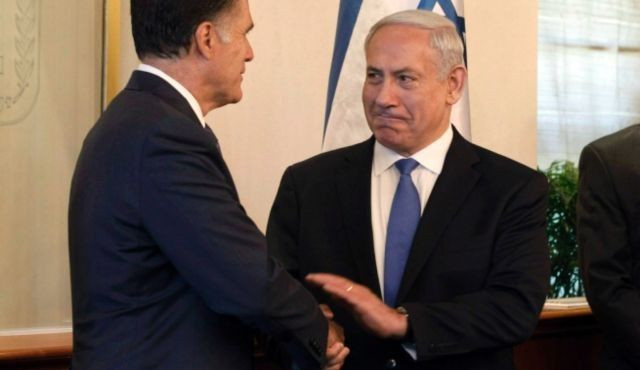Romney, Not Minicing Words, Tells Donors Palestinians Have 'No Interest' In Peace'

Mitt Romney's penchant for saying out loud and into a tape recorder what is usually better left behind closed doors has provided him and his campaign staff with a slew of PR headaches. His unscripted and presumably off-the-cuff remarks about London's preparedness for the Olympic Games, the less developed Palestinian culture, and describing Russia as America's "number one geopolitical foe" have landed him in hot water with foreign leaders, the media, and the polls.
But if nothing else, it has shown that Romney is not afraid to make definitive, and divisive, statements on foreign policy, and unabashedly has placed himself outside the mainstream by saying what no one else has so said so far, and in such un-spinnable terms.
On Tuesday it happened again, twice. Mother Jones leaked a video wherein Romney, speaking to a room of high-rolling campaign donors in Florida on May 17, even more firmly established his pro-Israel, anti-Palestinian, and anti-compromise stance.
"...the Palestinians have no interest whatsoever in establishing peace, and the pathway to peace is almost unthinkable to accomplish," he said. "I look at the Palestinians not wanting to see peace anyway, for political purposes, committed to the destruction and elimination of Israel, and I say there's just no way."
Romney did acknowledge that "these are problems -- these are very hard to solve ... you hope for some degree of stability, but you recognize that this is going to remain an unsolved problem."
Romney's strong and unwavering pro-Israel stance may look good to right-wing pro-Israel voters who already know for whom they are voting (he also unreservedly called Jerusalem the capital of Israel, something the Democratic National Convention had trouble doing).
Romney has also criticized President Barack Obama for turning down an invitation to meet with Israeli Prime Minister Benjamin Netanyahu, who is an old buddy of Romney's from Harvard Business School.
Whether or not the statement that the Palestinians do not want peace with Israel is true, Romney's declaration may drive away more moderate undecided voters who desire a compromise solution in Israel, particularly as it indicates that a President Romney would be less likely to work with Palestinian leaders.
The same Mother Jones video now causing a kerfuffle in foreign policy circles also revealed Romney's ideas on how to deal with Iran, which lines up with Israel's policy on Iran ("America could be held up and blackmailed by Iran, by the mullahs, by crazy people. So we really don't have any option but to keep Iran from having a nuclear weapon"); and on domestic issues, particularly on the "47 percent" of Americans (Obama supporters) who feel they are "entitled to health care, to food, to housing."
© Copyright IBTimes 2025. All rights reserved.






















